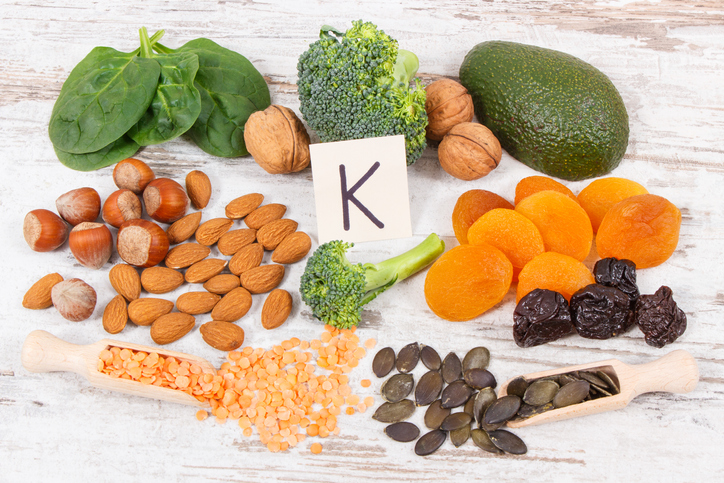Vitamin K Just Gave You More Reasons to Eat Your Green, Leafy Vegetables

By Joy Stephenson-Laws, J.D., Founder
Sometimes the most unassuming and lesser-known nutrients offer more health benefits than we may give them credit for. Consider, for example, vitamin K (not to be confused with the cereal of a similar name!). It was discovered in 1929 and got its moniker of vitamin K from the German word "Koagulationsvitamin" since it was originally identified as having an important role in our blood’s ability to clot after an injury like a cut. (Clotting prevents excessive internal or external bleeding).
Vitamin K is a fat-soluble vitamin, which means it is absorbed along with fats you eat and is stored in your body’s fatty tissue and liver. It can also be found in the brain, pancreas, heart and bones. Our bodies, however, store very little vitamin K so we need to constantly replace it through the food we eat.
There are two types of vitamin K, one logically called vitamin K1 and known as phylloquinone, and the other being a collection of several types of vitamin K2, collectively known as menaquinones. Vitamin K1, considered the natural form of the vitamin, is what we get from eating green leafy vegetables and vegetable oils. Vitamin K2 is manufactured by the bacteria in our intestines and is also found in fermented foods along with eggs and meat.
Recent research suggests that this vitamin has health benefits beyond blood coagulation. For example, studies indicate that people who eat diets rich in vitamin K have up to 34 percent lower risk of atherosclerosis-related cardiovascular disease. Atherosclerosis is plaque buildup in the arteries, which constricts blood flow. It also may rupture, which could result in a heart attack or stroke. The study, which tracked some 50,000 people over the course of 23 years, showed that patients with the highest consumption of vitamin K1 were 21 percent less likely to be hospitalized with cardiovascular disease related to atherosclerosis. Patients with diets rich in vitamin K2 showed a 14 percent lower risk of being hospitalized.

Other recent research led and reported by the respected Tufts University suggests that vitamin K may even offer protective health benefits for seniors. In this study, which included some 4,000 people from multiple ethnic groups, older adults aged 54 – 76 with low circulating vitamin K levels had a 19 percent higher mortality risk over the course of 13 years compared to participants with adequate levels of the vitamin.
Another benefit of vitamin K – and especially vitamin K2 – is the role it plays in helping keep our bones healthy and protecting us from osteoporosis. While more research needs to be done, there are some studies showing that people whose diets include more vitamin K-rich foods tend to have stronger bones. One study that followed more than 72,000 women for a decade found that women with lower vitamin K1 intake had a higher risk for hip fractures than women with higher intakes. And another that followed 800 men and women found that those with highest levels of vitamin K1 in their diets had around a 65 percent lower risk of hip fractures.
Other possible benefits of vitamin K, include lowering the risk of breast, prostate, and lung cancers; enhancing athletic performance; reducing the risk of developing cataracts; improving blood sugar control in diabetics; and enhancing the effectiveness of arthritis medicines.
- Have significant liver disease or damage, which can reduce your body’s ability to store vitamin K
- Take antibiotics, antacids and anti-seizure medications, which could cause your body to produce less of its own vitamin K or reduce the effectiveness of the vitamin K you consume
- Have problems absorbing fats, which can result from celiac disease or cystic fibrosis; a disorder in the intestines, gallbladder, and bile ducts, chronic pancreatitis, Crohn’s disease; or having part of your intestine removed
The most well-known risk of a vitamin K deficiency is excessive bleeding. Keep in mind that this bleeding may not necessarily be external, such as from a cut, but may also be internal. Indications of internal bleeding include dark black stool, blood clots under the nails and bruising easily. Other symptoms include low bone density, heavy menstrual periods and increased blood clotting time.
Infants are also at risk for vitamin K deficiency since they are born with very little vitamin K in their bodies. This risk can also be linked to being exclusively fed breast milk since breast milk is low in vitamin K; to there being very little storage of the vitamin in the newborn’s liver; and because vitamin K does not readily pass through the placenta.
A deficiency in newborns may cause a bleeding disorder, which can result in dangerous and life-threatening bleeding in the brain. The good news is that this deficiency can readily be prevented by a vitamin K1 injection, which is why it is recommended to give them this injection at birth. In fact, studies show that infants who do not receive a vitamin K shot at birth are 81 times more likely to develop this bleeding disorder than infants who do receive it.
How to be Proactive with Vitamin K
While there is no established Recommended Dietary Allowance (RDA) for vitamin K, there is what is known as an “adequate intake” (AI) for this important vitamin. The AI is what you need to ensure nutritional adequacy. For vitamin K, the AI for adults 19 years and older is 120 micrograms a day for men and 90 for women. You can most likely get this AI with just one serving of a vitamin K-rich food.
The best way to make sure that you are getting the amount of vitamin K that your body needs is by getting a nutrient test. Should the results indicate that you have a vitamin K imbalance or deficiency, you can work with your doctor or other competent healthcare professional to identify its cause and then take appropriate steps to address and correct it.
As with other nutrients, the amount of vitamin K your body absorbs may be impacted by other nutrients. It also can have serious interactions with some medications. Large doses of vitamin E and vitamin A, for example, can antagonize vitamin K. In the case of vitamin E, it has been found to interfere with coagulation. Excess vitamin A, for its part, appears to make it more difficult for your body to absorb vitamin K.
You also should talk with your doctor about your vitamin K intake if you are taking an anticoagulant such as warfarin. This medication works by reducing your liver’s ability to use vitamin K to manufacture the various compounds your blood needs to clot. If you increase or decrease the amount of vitamin K, this could impact how well your anticoagulant medication works. Another medication that could interact with vitamin K is orlistat, which is taken to facilitate weight loss. Since it reduces the amount of fat your body absorbs, it can also impact how much vitamin K it absorbs.
You can find vitamin K in green leafy vegetables such as kale, spinach, collards, cabbage, broccoli, and asparagus. Other sources include vegetable oils, blueberries, figs, eggs, soybeans, and dairy products.
Enjoy your healthy life!
Disclaimer: This article is not intended to provide medical advice. Please consult with your doctor or another competent healthcare practitioner to get specific medical advice for your situation.
The pH professional health care team includes recognized experts from a variety of health care and related disciplines, including physicians, attorneys, nutritionists, nurses and certified fitness instructors. This team also includes the members of the pH Medical Advisory Board, which constantly monitors all pH programs, products and services. To learn more about the pH Medical Advisory Board, click here.







